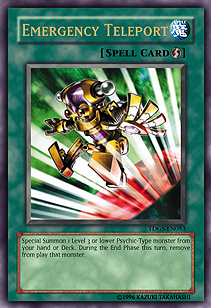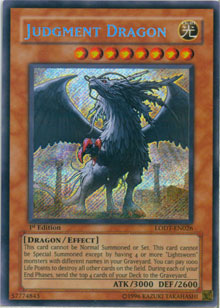 I’ve noticed a highly disturbing trend lately. I’m not sure where it started or how it spread so fast, but for some reason, lately players have been obsessed with removing themselves from the game and letting a robot take their places. This comes as a direct result of the wacky theory that you can actually win every single game you ever play as long as you’re "perfect." Winning every game in a single tournament is quite possible. In fact, doing it in more than one tournament is possible if you’re good enough, but in a game like this, no matter how good you are, you truly cannot win them all. Shocking, I know. I understand that this might come as a surprise to the players who have already conditioned themselves to believe that they are your deity of choice’s gift to the Yu-Gi-Oh! TCG, but none of us are perfect. None of us can be perfect. Even if we were, it wouldn’t guarantee jack, squat, or any combination thereof, so I hope you can understand my frustration when perfectly reasonable people resort to rote memorization and regurgitation of standard plays and then get upset when they lose, especially to players who are better than them.
I’ve noticed a highly disturbing trend lately. I’m not sure where it started or how it spread so fast, but for some reason, lately players have been obsessed with removing themselves from the game and letting a robot take their places. This comes as a direct result of the wacky theory that you can actually win every single game you ever play as long as you’re "perfect." Winning every game in a single tournament is quite possible. In fact, doing it in more than one tournament is possible if you’re good enough, but in a game like this, no matter how good you are, you truly cannot win them all. Shocking, I know. I understand that this might come as a surprise to the players who have already conditioned themselves to believe that they are your deity of choice’s gift to the Yu-Gi-Oh! TCG, but none of us are perfect. None of us can be perfect. Even if we were, it wouldn’t guarantee jack, squat, or any combination thereof, so I hope you can understand my frustration when perfectly reasonable people resort to rote memorization and regurgitation of standard plays and then get upset when they lose, especially to players who are better than them.
Obviously, there is nothing wrong with knowing all the standard plays for your deck of choice, but unwillingness to change or adapt in the thick of battle has lead to an incalculable number of losses for duelists everywhere, frequently to players who lack that particular negative trait. Playing "by the book" is almost guaranteed to let you make the "strongest" move in a given scenario, but it isn’t necessarily going to maximize your chances to win the current duel. It’s not like there’s a pile of cards with a manual that says "follow these instructions and you’ll win every game!" If there was, we wouldn’t have a game at all, and you still wouldn’t win all your duels because I can guarantee that everyone else would be using that pile and manual as well. Remember, someone must lose each match, and that person will have lost at least one duel. Even a theoretical mathematically perfect engine of TCG destruction can’t guarantee a win every time, so what should we do if we want to win as much as we possibly can? We should make good use of the fact that only we know what we’re thinking at any given time.
I’m a 23 year old college graduate with a degree in astrophysics. I had a job waiting for me out of college. Three months later I got laid off, but as a result I found the job of my dreams, as a part of a team creating computer games in my home town of Pittsburgh, PA. Writing for this site has helped me vastly improve my communication skills, and I credit the work I’ve done here for giving me the tools of expression needed to never get anything less than an A on any of the papers I wrote in college. All the preceding sentences in this paragraph are false . . . or are they?
Frankly, there’s no way for you tell how much is truth and how much is fiction, and that’s exactly how I like it. When you look in the mirror, you aren’t seeing yourself as you are, but how others see you. This is something you have control over. Similarly, when you sit down at the table, what your opponent sees and hears is only what you want that player to see and hear. This isn’t the cartoon. That guy across from you can’t see what cards you’re holding or what you’re planning to do . . . but the opponent might tell you that he or she can. Regardless, that person is still just guessing at what’s going on. Depending on the information you reveal based on your posture, what you say, how you hold your cards, etc. you could be improving the opponent’s chances of guessing correctly. The "duel by numbers" crowd ignores the bonus information they might be receiving and tries to reduce everything to simple probabilities before finally making the choice that has the highest probability of being the "right" one. The reason these people don’t win all the time is because the best players in the game abuse this fact by doing things that are out of the ordinary and can’t be predicted by mathematics. Cesar Gonzalez in particular has had an incredible run over the past few months despite piloting the same, predictable deck at every Jump he’s played because he relies on his own instincts and intuition rather than simply playing by the numbers.
The problem of course, comes when your instincts are terrible. You can’t make very accurate predictions or reads if you don’t know anything about the metagame. Furthermore, even if you were to know every card your opponent could possibly have, you’d still be grasping at straws in-game unless you had significant table time beforehand to teach you how all those cards work and the ways in which they can be used. In fact, I would suggest that the best way to learn how to play against a particular deck is to learn how to play it yourself. If you know all the moves and what they look like, you’re better equipped to recognize them when your opponent tries to use them against you. Beyond that level of thinking is where the best players reside. To bring your game up even further, you need to be able to take your opponent’s expectations and use them against him or her. Either by doing something that you aren’t "supposed" to do or disguising one play as another, you take control of the game by knocking the opponent out of his or her comfort zone and forcing that player to react to something the opponent may never have seen or considered before. This is how you assert your dominance over the opponent while he or she claims that you got lucky and that you’re winning despite making "so many misplays."
 Frankly, I’m sick of seeing the word "misplay" being savagely abused by people who were flat out outplayed. It’s not a misplay if you do something totally reasonable and just get beat anyway. That happens sometimes. You could have perfect reads on your opponent and make every single play as correctly as humanly possible and still lose because there’s still one card that no one can predict: the card on top of your opponent’s deck. If you’ve been playing at all for the last year, then surely you know that cards like Judgment Dragon, Dark Armed Dragon, and Cold Wave can make everything you’ve done irrelevant in a second. Again, this is something that you need to recognize and accept before you can grow as a player. Being able to learn the difference between actual mistakes that make you lose, non-fatal errors, poor deck performance, and solid play from your opponent is an integral part to growing as a player, and it’s an ability that most players I meet seem to lack. This is where it comes in handy to actually have people there watching you play. It isn’t helpful to have people there who will watch you play and then berate you for not having the benefit of hindsight while you’re at the table.
Frankly, I’m sick of seeing the word "misplay" being savagely abused by people who were flat out outplayed. It’s not a misplay if you do something totally reasonable and just get beat anyway. That happens sometimes. You could have perfect reads on your opponent and make every single play as correctly as humanly possible and still lose because there’s still one card that no one can predict: the card on top of your opponent’s deck. If you’ve been playing at all for the last year, then surely you know that cards like Judgment Dragon, Dark Armed Dragon, and Cold Wave can make everything you’ve done irrelevant in a second. Again, this is something that you need to recognize and accept before you can grow as a player. Being able to learn the difference between actual mistakes that make you lose, non-fatal errors, poor deck performance, and solid play from your opponent is an integral part to growing as a player, and it’s an ability that most players I meet seem to lack. This is where it comes in handy to actually have people there watching you play. It isn’t helpful to have people there who will watch you play and then berate you for not having the benefit of hindsight while you’re at the table.
Let’s face facts. Even if you knew everything that was going to happen well in advance, there’s still no guarantee that you could have won. Standing up from a match and hearing about how you’re terrible because you weren’t standing there seeing every card the opponent drew and set is not useful. Seeing a new move being played and learning to recognize the timing in which it was played is useful. Hindsight can be a powerful learning tool in constructing new moves to counter other moves that caused unexpected losses, but if you use it as whip to flog yourself with after every loss, you aren’t going to grow as a person or a duelist. I mean, when was the last time that flogging in general helped someone grow? It’s got a much higher chance of killing you than it has of making you stronger.
Finally, I can’t stress enough the power of positive thinking. If you don’t show up to a tournament thinking that you can win, then you can’t win. Similarly, if you sit down across from a top player and immediately think to yourself, "I can’t beat this guy!" then you aren’t going to beat that guy. You empower yourself by practicing and learning the ins and outs of the metagame, not by beating yourself up over past failures and trying to find a "perfect deck" that simply doesn’t exist. Just as it says at the top of the page, it’s all you. You are your successes and your failures, your triumphs and regrets. At the end of the day, you are the one that has to live with the choices that you did or did not make and take responsibility for your actions. You have the power to shape the metagame through your own hard work and determination. You are the one that cares the most about whether or not you succeed, and you are the only person that truly knows if you’re satisfied with your performance.
Until we meet again, play hard, play fair, and most importantly, have fun.
-Jerome McHale